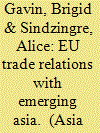| Srl | Item |
| 1 |
ID:
086406


|
|
|
|
|
| Publication |
2009.
|
| Summary/Abstract |
Trade interdependence between Europe and Asia has rapidly increased in recent years. Europe-Asia trade flows now constitute a 'third link' in the global economy. As trade expands, however, global trade governance has declined and free trade agreements (FTAs) have increased. Hence, the Global Europe strategy has been designed to enhance trade relations with emerging Asia which is the most dynamic region in the global economy today. But Asia's model of export led growth leaves it more exposed to shocks emanating from outside the region than ever before raising questions about its sustainability. Deep integration agreements between Europe and Asia are needed to foster economic growth. They also need a development dimension to help Asian countries address their key development challenges.
Brigid Gavin was the Research Coordinator of the workshop on 'Deep Integration and North-South Free Trade Agreements: EU Strategy for a Global Economy' which provided the papers and discussion forum for the articles in this special edition. The workshop took place at the United Nations University-Comparative Regional Integration Studies (UNU-CRIS) centre in Bruges, Belgium on 19-20 June, 2008. She wishes to express her thanks to Mr Luk Van Langenhove, Director of UNU-CRIS for financial support and to all the authors and participants in the workshop for their contribution to making this project a real success. A special word of thanks goes to Lars Nilsson, Chief Economist Unit, DG Trade, European Commission for his opening presentation to the workshop.
Alice Sindzingre is Research Fellow, National Centre for Scientific Research (CNRS), University of Paris and Visiting Lecturer at School of Oriental and African Studies (SOAS), University of London. This analysis draws from her paper 'The EU Economic Partnership Agreements with Africa' which she presented at the workshop and available on the UNU-CRIS website.
|
|
|
|
|
|
|
|
|
|
|
|
|
|
|
|
| 2 |
ID:
086415


|
|
|
|
|
| Publication |
2009.
|
| Summary/Abstract |
Since April 2007, the EU Commission has been entrusted to start negotiating a FTA with ASEAN countries. Being enshrined in the logic contained in its 'Global Europe strategy', the proposed EU-ASEAN FTA finds its economic rationale in the expected overall positive impact found by most econometric studies on the topic. This article argues that although beneficial, these studies are limited conceptually and methodologically. In particular, they are unable to tackle the issue of differentiated effects on several groups of stakeholders. By analysing, through a questionnaire, the opinion of a number of ASEAN stakeholders, this article brings complementary information on the perception of the planned EU-ASEAN FTA by these different stakeholders. Whilst offering many opportunities, the FTA presents also a number of risks, the most critical one being the costs of adjustment, particularly for poorer ASEAN member countries.
|
|
|
|
|
|
|
|
|
|
|
|
|
|
|
|